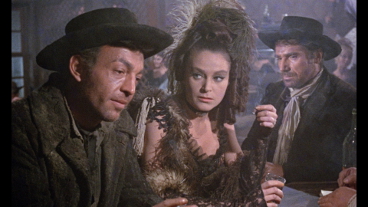
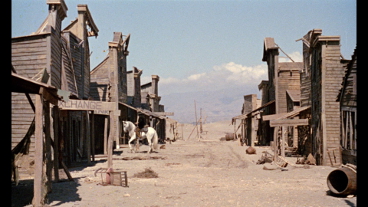

The Rogers family chase down Ben and string him up in front of his pleading wife Maria Caine (Michèle Mercier), before burning down the house of Thomas Caine. The Rogers clan have vowed revenge against the Caine family for the theft of a large quantity of money. Maria travels to an old ghost town where she finds Manuel (Robert Hossein). She persuades him to take back up his gun and seek revenge on the Rogers family for what they have done and he travels to town to infiltrate their group...

|

|
Co-written by Robert Hossein along with his frequent collaborator Claude Desailly (Le vampire de Düsseldorf (1965)), Une corde, un Colt... is a distinctly unusual genre entry. The European Western had been defined in the middle of the 1960s by Sergio Leone's iconic Dollars trilogy, introducing powerful, often surrealistic stylisation and ambiguous morals to a native American genre that was typically personified by straight-forward storytelling and clear-cut heroes and villains - subsequently a whole host of Italian imitators took ideas from Leone's productions to create their own films and the Spaghetti Western was born. Many of these imitations were underwhelming, taking ideas like the strong, silent killer and feuding clans to make an endless stream of cookie-cutter Westerns that dominated Euro-Western production in the late 1960s.
Fortunately some film-makers would take these ideas and themes and work them into very different projects. Hossein and Desailly had worked together on the Mexican Revolution film Le goût de la violence (1961) which boasted moody black and white photography, sparse dialogue and emphasis on the visuals, several years before Per un pugno di dollari (1964). In Une corde, un Colt... they take Leone's 'man with no name' and throw him into an even more nihilistic and twisted tale of revenge than Leone came up with - he is still a man with no past who can shoot with unerring precision, but no longer has the stony-faced anti-hero resolve or the apparent motivation of the genre's usual leads. The whole concept of revenge, a theme typically seen as an honourable and noble persuit in Westerns, becomes a twisted, unsatisfying and almost meaningless entity here and the definition of good and bad is more ambiguous than in any other genre title.

|
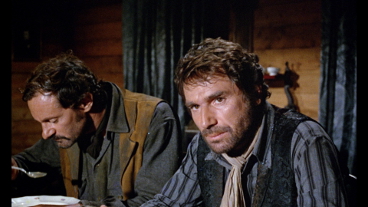
|
The storyline is slow paced with minimal dialogue, little is explained and ultimately very little actually happens, the entire story could form a quick chapter in one of the more briskly paced Castellari Westerns. Yet, the film certainly never drags and manages to provide a surprising number of gunfights and action scenes, all of which feel essential to the storyline. Characters are all well defined and the moody atmosphere is retained well throughout, without the delving into comic relief that lets down so many other European films of the era. The unusual nature of the film and its moral ambiguity mean that its direction is often hard to predict and it builds to a highly effective ending with a neat conclusion.
Like the script Hossein's direction takes the familiar Spaghetti Western 'look' and adds a grim noirish undertone - the smoke filled saloon bar is a particular highlight - and the Almeria deserts never looked so grim and lonely. Some unusual camera angles and lighting tricks give the whole film an unconventional feel. Robert's father André Hossein, provides the soundtrack with an instantly memorable theme song remniscent of the earlier Italian Westerns, but with some really well used guitar in the body of the film that provides tension and works very well. Sergio Leone guest directed one of the most fascinating scenes of the film, a lengthy dinner table sequence that builds from innocuous to major plot game changer in such a subtle way it will completely blindside even the most experienced genre fan.
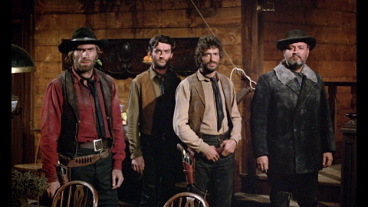
|
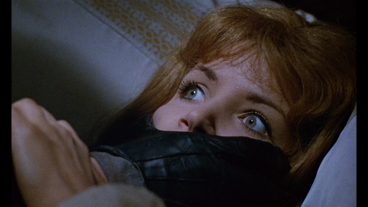
|
As usual Robert Hossein plays the main role and his downbeat approach to the character is perfectly suited to the film as a whole. Top billed is French actress Michèle Mercier, star of the Angélique film series of the mid-1960s in which Hossein had co-starred - she is cast as the brooding widow in complete contrast to the romantic lead in the bodice-ripping Angeliqué films, she seems to really suit the role. A few familiar genre faces appear, including Guido Lollobrigida (credited as Lee Burton), while Fabio Testi makes a brief early career appearance in an uncredited part at the beginning of the film.
A very personal project from a director who made no other genre entries, Une corde, un Colt... is reminiscent of Mario Lanfranchi's Sentenza di Morte, an outsider's look at a genre that was already dominated by clichés, taking some familiar characters and emphasising stylism and surrealism over the storytelling to make something both familiar and unusual. Une corde, un Colt... is not for a viewer hoping for a shoot-'em-up Western, or something lighthearted but it should certainly appeal to fans of the original Leone trilogy with its stunning visuals and interesting ideas. A real genre gem and highly recommended.
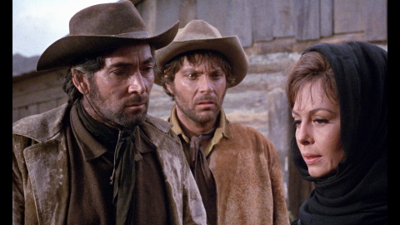
|

|
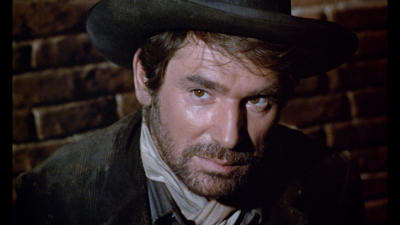
|
| Anyone famous in it? | Michèle Mercier - a French actress best known for Angélique, marquise des anges (1964) and its sequels. |
| Directed by anyone interesting? | Robert Hossein - a French born film-maker, he directed a few films including Les misérables (1982), but was better known as an actor, appearing in a number of films including Du rififi chez les hommes (1955) |
| Any gore or violence ? | Some blood and harsh beatings, nothing gory. |
| Any sex or nudity? | An implied rape scene. |
| Who is it for? | Highly recommended for Spaghetti Western fans, particularly fans of the Leone films. |
| Visuals | Original Aspect Ratio - 1.66:1 anamorphic widescreen. Colour. 1080p HD A good looking print with a lot of detail and natural grain. Some print damage, most notable at the start. |
| Audio | English LPCM 1.0 Mono Italian LPCM 1.0 Mono Both audio tracks are clear with the music coming through very well. |
| Subtitles | English HOH for the English audio English translation for the Italian audio. |
| Extras | The disc includes:
|
| Region | Region A/B (USA, North America / UK & Europe) - DVDs are Region 1/2 - NTSC |
| Other regions? | This is a simultaneous, indentical release in the USA and UK, both discs are identical, only the packaging has minor variations. Previously available on DVD in Germany and Japan with English audio. |
| Cuts? | The film is believed to be fully uncut. Print language is Italian and features black and white opening credits scene, other versions of the print featured sepia tinting in this same sequence and this was used on the SPO Japanese DVD. |